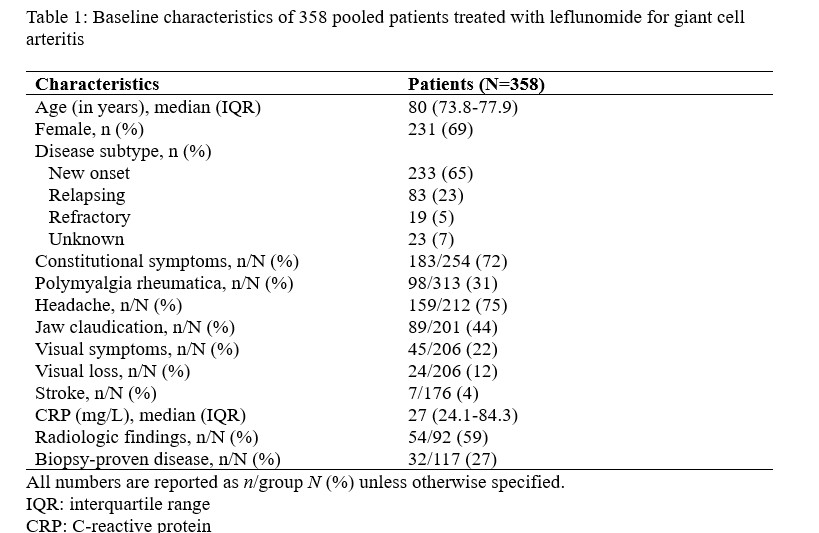Session Information
Date: Sunday, October 26, 2025
Title: (0731–0764) Vasculitis – Non-ANCA-Associated & Related Disorders Poster I
Session Type: Poster Session A
Session Time: 10:30AM-12:30PM
Background/Purpose: The objective of this systematic review is to assess the effectiveness of leflunomide in the treatment of new-onset, refractory or relapsing giant cell arteritis (GCA) as a glucocorticoid (GC)-sparing agent.
Methods: A systematic review was conducted using MEDLINE, CENTRAL, EMBASE, and conference proceedings to identify studies on leflunomide in patients with GCA. We included randomized controlled trials, cohort studies, case-control studies, and case series. The primary efficacy outcome was the proportion of patients who attained GC-free remission with leflunomide assessed at any time between 6 to 12 months of therapy. GC-free remission was defined as the absence of signs or symptoms of GCA, and/or normalization of inflammatory markers, and/or radiologic response, and complete discontinuation of GC. Our secondary efficacy outcome was the proportion of patients who attained low-dose GC remission ( < 5 mg of prednisone equivalent). All included studies were appraised for risk of bias. We performed a meta-analysis of proportions using a random-effects model and a restricted maximal likelihood approach. We evaluated heterogeneity with I2 and Cochran’s Q test. Publication bias was assessed by producing funnel plots for each outcome.
Results: 357 studies were screened with 10 observational studies included in the final analysis. Out of the 358 patients that we pooled for analysis, 231 (69%) were females (table 1). A total of 233 (65%) patients had new-onset GCA, 83 patients had relapsing GCA (23%), and 19 patients had refractory GCA (5%). The disease subtype was not specified for 23 patients. The proportion of patients achieving GC-free remission with leflunomide was 45%, (95% CI 0.25-0.64, p < 0.001, 7 studies) (figure 1). Substantial statistical heterogeneity was present (I2=90.3%, Q=70.7, p < 0.001). Meanwhile, the pooled proportion of patients achieving low-dose GC remission was 48% (95% CI 0.27-0.69, p < 0.001, 6 studies). Funnel plots were slightly asymmetrical, which suggested the presence of publication bias as well as possible poor methodological quality in the reporting of outcomes. All the included studies were deemed to be at serious risk of bias.
Conclusion: The main challenge in treating GCA is achieving and maintaining remission with minimal glucocorticoids. Our study shows that leflunomide may offer potential benefits in achieving remission without GCs or with low-dose GCs; however, the results exhibited variability due to differences in sample sizes and inconsistent reporting. Leflunomide’s role as a glucocorticoid-sparing agent is promising but needs further investigation into higher-quality studies. PROSPERO registration CRD42023490373.
To cite this abstract in AMA style:
Zhu L, Mendel A, Ross C, Makhzoum J. The Efficacy of Leflunomide in the Treatment of Giant Cell Arteritis: A Systematic Review and Meta-Analysis [abstract]. Arthritis Rheumatol. 2025; 77 (suppl 9). https://acrabstracts.org/abstract/the-efficacy-of-leflunomide-in-the-treatment-of-giant-cell-arteritis-a-systematic-review-and-meta-analysis/. Accessed .« Back to ACR Convergence 2025
ACR Meeting Abstracts - https://acrabstracts.org/abstract/the-efficacy-of-leflunomide-in-the-treatment-of-giant-cell-arteritis-a-systematic-review-and-meta-analysis/


.jpg)